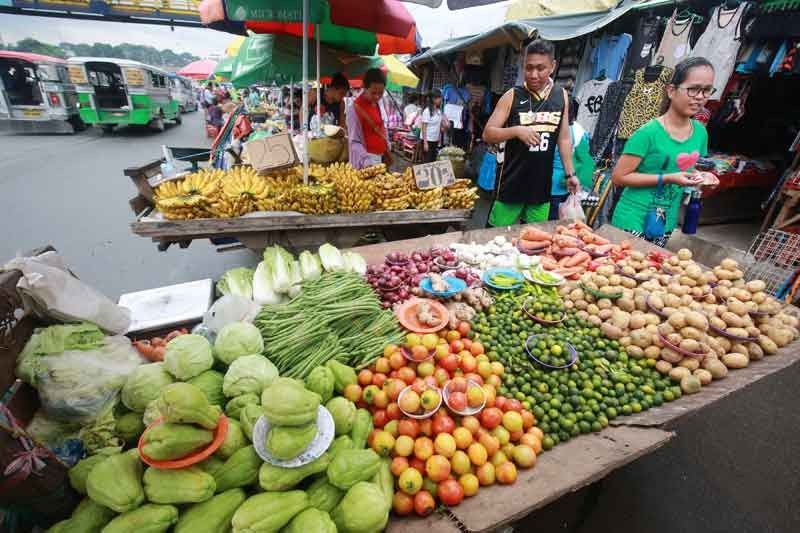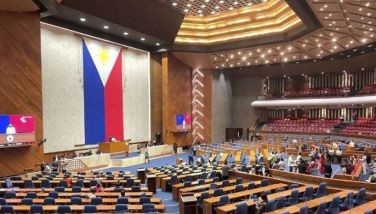Executive order sets zero tariffs to ease food inflation

Food imports to flood market
MANILA, Philippines — High food prices? Flood the market with imports.
President Duterte is expected to issue an executive order (EO) reducing to zero the tariffs on imported fish, corn, vegetables and feed wheat to curb inflation, Albay Rep. Joey Salceda said yesterday.
Socioeconomic Planning Secretary Ernesto Pernia also revealed at a Senate hearing the impending issuance of an EO on tariff cuts for certain agricultural products and the imposition of tariff on rice.
Pernia said a public consultation on the issue is set for tomorrow.
Salceda told a news forum that the President would issue the order after Congress goes on an 11-day recess next weekend.
He said the reduction of tariffs on these imported products was among the counter-inflation measures Speaker Gloria Macapagal-Arroyo and other House leaders had agreed upon with the President’s economic advisers last week.
He revealed imported meat was removed from the list after industry leaders made a “strong lobby” with the Palace.
“It’s not ours. It’s the executive department that doesn’t like it. If they don’t like it, what could we do?” Salceda told the Kapihan sa Manila Bay forum.
Arroyo clarified that she was “not advocating the importation of meat products at reduced tariff rates considering that there are other more substantive drivers of inflation as cited in the PSA (Philippine Statistics Authority) survey.”
Pernia said temporary tariff cuts are being readied for some agricultural products like corn, wheat flour, chicken and vegetables.
Inflation represents the increase in the prices of goods and services. According to the PSA report, inflation in July further jumped to 5.7 percent from 5.2 percent in June.
Critics blame rising consumer prices largely on new and higher taxes on diesel, kerosene, cooking gas and bunker fuel for electricity generation imposed under the controversial Tax Reform for Acceleration and Inclusion (TRAIN) law.
Salceda, who describes himself as Arroyo’s focal person for anti-inflation measures, said the measures agreed with the President’s economic team included deferring “regulated price adjustments” for electricity, water and even certain oil products, and the importation of 500,000 to 800,000 metric tons of rice.
“What we really need to do is arrest momentum to prevent any speculation… We should bring immediate relief to consumers, especially the poor, to bring inflation back to four percent,” he said.
“Next month, without measures, we see inflation peak at 5.9 percent and this will hover around 5.6 percent till yearend. With vigorous measures, we can see July to be the peak inflation with September falling to 5.6 percent,” Salceda said.
“Mas mabilis pa ang inflation (Inflation is faster). I would say this is possibly the first near crisis of this administration,” he added.
Rep. Michael Romero of party-list 1-Pacman, an economist like Arroyo and Salceda, said the counter-inflation measures proposed by the Speaker are intended to cut inflation by at least 1.8 percent.
“At this point, the specifics must come from the President’s economic managers. The departments, for example, must send to us the list of fish and other products whose tariffs can be reduced to zero,” he said.
Enough time to ready EO
Senate President Vicente Sotto III said the Senate and the House of Representatives will adjourn session from Aug. 16 to 27 to allow Duterte to issue the order.
Sotto said despite the two-week break, Congress will actually just lose one session day, which is sandwiched between non-working holidays and weekends.
Letting Congress do its task of setting tariffs would take time and require public hearings with affected sectors.
Also, the Senate is still discussing the Rice Tariffication Bill, which seeks to impose a 35 percent tariff on rice imported from other Southeast Asian countries in lieu of quantitative restrictions.
Senate Minority Leader Franklin Drilon said the adjournment would allow Duterte to set tariffs while Congress is drafting the necessary legislation.
Sen. Cynthia Villar, chair of the committee on agriculture and food, said plenary deliberations on the bill may start soon.
Villar said the bill needs to be passed as soon as possible so the country can avoid possible sanctions from the World Trade Organization (WTO), which required the lifting of quantitative restrictions as part of its mandate to liberalize trade.
The country usually imports rice from Thailand and Vietnam.
The Senate will also conduct an inquiry into the failure of certain government agencies to put behind bars suspected rice smugglers despite the enactment of the Anti-Agricultural Smuggling law two years ago.
The probe by Villar’s committee was prompted by a resolution filed by Sen. Joseph Victor Ejercito seeking an audit on the implementation of Republic Act 10845 of 2016, which imposes a penalty of life imprisonment and other penalties on any person found guilty of large-scale agricultural smuggling.
At a recent Senate hearing, Ejercito noted the prevalence of the use of fake import permits as well as delays in the filing of cases against erring traders. The Bureau of Customs (BOC) was only able to file three cases with the Department of Justice (DOJ).
“Allegedly, the cases are still pending before the DOJ,” Ejercito said.
Only last month, the BOC discovered the unauthorized release of over a hundred containers from the Mindanao International Container Terminal in Misamis Oriental that may have contained agricultural products, he said.
Uniform 5% rate
At a press briefing, Budget Secretary Benjamin Diokno said the Duterte administration is “leaning towards the uniform reduction (of tariffs) to five percent.”
“We want to make it five so it’s simpler, more uniform. A standard rate like five is kind of neutral” and “does not affect the consumption of goods,” Diokno said.
At the Senate, economic managers said the planned tariff cuts would not significantly affect revenue collection. They were responding to questions from Sen. Ralph Recto.
Finance Secretary Carlos Dominguez III said duties on chicken and fish alone have reached P1.9 billion.
Pernia told reporters after the hearing that the reduction in tariffs would only be temporary or until inflation normalizes next year.
He said tariff for fish products is at 15 percent; meat, 20 percent; corn, 35 percent; feed wheat, seven percent, and vegetables, 40 percent.
Aside from reducing tariffs, Dominguez said the government wants to reduce the processing time for permits and phytosanitary certificates and lift some restrictions on meat products.
The finance chief said easing both tariff and non-tariff barriers would help the government temper the increase in consumer goods.
Agriculture industry stakeholders, meanwhile, have expressed support for the government’s plan for more importation of basic commodities like pork, fish and chicken.
“We do not have problem with that. Last year we also imported additional pork. For as long as the proper tariff will be implemented, we have no problem with that,” Rosendo So, chairman of the Samahang Industriya ng Agrikultura (Sinag), said yesterday.
The industry earlier expressed concern over proposals to remove tariff on pork and fish imports as part of measures to ease inflation.
“Reducing tariffs to zero percent will annihilate the agriculture sector with the expected dumping of cheaper agri imports,” So said.
A consumer group, for its part, is pushing for a moratorium on price increases on basic goods at least until the end of the first quarter next year.
“In two weeks’ time, we shall enter the ‘ber’ months where pressures on demand and supply of basic necessities and prime commodities can trigger another round of price increases,” Laban Konsyumer Inc. said in a statement.
TRAIN is culprit
Meanwhile, Anakpawis party-list Rep. Ariel Casilao said the new 5.7 percent record inflation in July should leave no doubt that TRAIN law has done more harm than good.
“Inflation had been relatively low in the last three years until the Duterte administration implemented its TRAIN law which increased prices overnight and drove inflation higher for seven straight months now,” Casilao said.
He cited a study indicating that “the soaring inflation in the last six months has caused the loss of about P933 to P2,715 in the income of each of some 60 million Filipinos.
“The inflation rate rose to 5.7 percent in July, the highest and fastest in five years. It was mainly pushed by price spikes in fuel, food and transportation, with food prices registering a year-on-year increase at 7.1 percent,” he pointed out.
He accused the Duterte administration of “making it appear that the 5.7 percent inflation in July was triggered more by supply problems, not by its economic policies.” – With Mary Grace Padin, Louise Maureen Simeon, Louella Desiderio, Ding Cervantes, Ghio Ong
- Latest
- Trending































